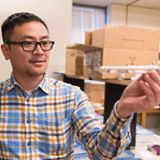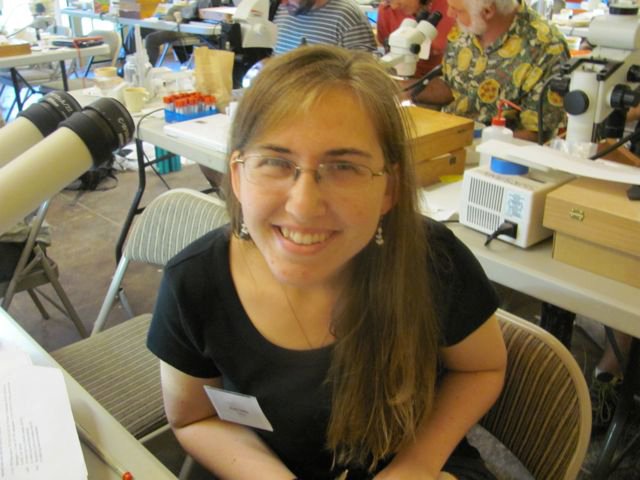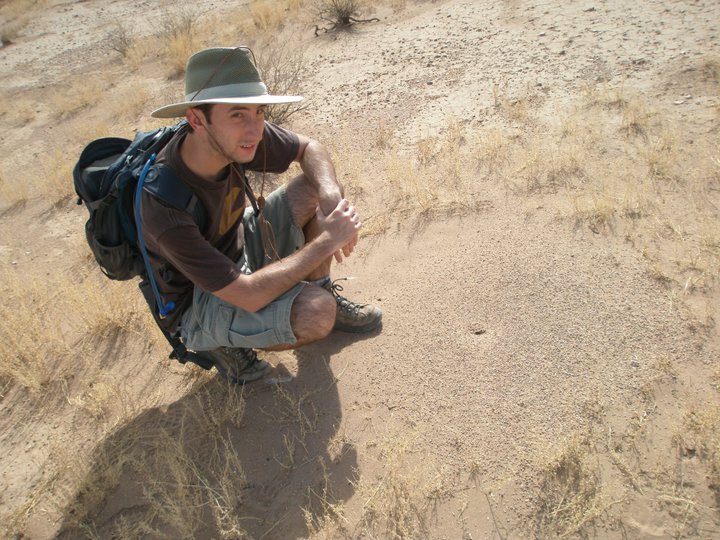Helms/Helms Cahan Research Laboratory
Marsh Life Science, University of Vermont
Kit Lefevre, BS
 Juvenile Hormone is a pleiotropic hormone responsible for many different functions in insects, but in eusocial insects such as bees, wasps, and ants it serves the function of regulating age related tasks, also known as temporal polyethism. Increased levels of Juvenile Hormone that accumulate with age have shown to lead to older ants foraging outside of the colony as opposed to brood and nest care inside of the colony. By manipulating levels of Juvenile Hormone in worker ants the hypothesis is formed that higher levels of Juvenile Hormone added to the ants would result in the Experimental Ants having an earlier onset and intensity of foraging. However, collected data suggests that levels of added Juvenile Hormone tend to inhibit foraging behavior in Pogonomyrmex barbatus ants, resulting in the need for future research to determine the reasons behind the inhibition.
Juvenile Hormone is a pleiotropic hormone responsible for many different functions in insects, but in eusocial insects such as bees, wasps, and ants it serves the function of regulating age related tasks, also known as temporal polyethism. Increased levels of Juvenile Hormone that accumulate with age have shown to lead to older ants foraging outside of the colony as opposed to brood and nest care inside of the colony. By manipulating levels of Juvenile Hormone in worker ants the hypothesis is formed that higher levels of Juvenile Hormone added to the ants would result in the Experimental Ants having an earlier onset and intensity of foraging. However, collected data suggests that levels of added Juvenile Hormone tend to inhibit foraging behavior in Pogonomyrmex barbatus ants, resulting in the need for future research to determine the reasons behind the inhibition.
Andrew D. Nguyen, Ph.D
 Andrew successfully defended his Ph.D. dissertation in March of 2017 at the University of Vermont. His research focused on understanding species vulneralbility or resiliency to pending temperature shifts by investigating how different species have historically adapted to changing climates. For this work Andrew combined lab studies, field work, and computational approaches (statistics, bioinformatics, phylogenetics) to determine the extent to which species' physiologies match their thermal environment.
Andrew successfully defended his Ph.D. dissertation in March of 2017 at the University of Vermont. His research focused on understanding species vulneralbility or resiliency to pending temperature shifts by investigating how different species have historically adapted to changing climates. For this work Andrew combined lab studies, field work, and computational approaches (statistics, bioinformatics, phylogenetics) to determine the extent to which species' physiologies match their thermal environment.
Andrew has taken a post-doctoral research position in Dr. Dan Hahn's lab at the University of Florida. Begining in July of 2017, Andrew will be looking at how insects interact with their environment and physiological mechansims of environmental stress resistance.
Katie Miller, MS

Climate change is predicted to result in increased average temperatures and climate variability across the globe. Shifts in climate are likely to affect the distribution, quality, and quantity of essential nutritional resources for terrestrial consumers, while at the same time changing their nutritional requirements. Understanding how these shifts will affect the success of organisms is crucial to be able to accurately predict species responses to climate change.
Thus, I am broadly interested in how organisms allocate nutrients in a thermally variable environment. My current work focuses on deciduous forest ants in the genus Aphaenogaster. They are an ideal model system to study the nutritional effects of climate change because they occur across a wide thermal gradient, distinct nutritional resources are used by different ant colony members, they are numerically abundant, and they provide essential ecosystem services. The bulk of my work aims to link the nutritional ecology and thermal biology of ants to biogeochemistry, organismal performance, functional traits, and biochemical characteristics of ants. Please see my website for more information.
Dr. Michael Herrmann

Michael's research in the Helms/Helms Cahan lab focused on sexual conflict and chemical communication in hybridizing harvester ants. Due to the unusual genetic caste determination system found in certain species of Pogonomyrmex harvester ants, males and queens receive different fitness payoffs from mating. I study how this difference in fitness plays out during mating swarms in these species. In addition, my research studied how cuticular hydrocarbons play a role in this conflict. I was also interested analyzing and understanding the evolutionary tradeoffs expected in cuticular hydrocarbons, due to their role as both communication cues, as well as their use in water-proofing the cuticle of insects. I have also completed work on linkage mapping in Pogonomyrmex ants, as well as quantitative trait loci analysis on cuticular hydrocarbons.
Dr. Lucia C. Orantes

Co-advised by Sara Helms Cahan in the Biology Department and Kimberly Wallin in in Natural Resources at RSENR. Lucia studied the landscape genetics and dispersion patterns of the Chagas disease vector, Triatoma dimidiata, in Guatemala. She was funded by an NSF Evolution and Ecology of Infectious Diseases grant.
Lucia is currently working as an Epidemiologist at the Vermont Department of Health where she creates and manages the Vermont Birth Information Network for Zika Response as part of the CDC's efforts to establish a country-wide active surveillance of adverse outcomes possibly linked to Zika virus infection during pregnancy.
Heather Axen, PhD. worked on the biogeography and ecology of intraspecific hybridization in North American fire ants. She is now a Assistant Professor at Salve Regina, Newport, Rhode Island.
John Stanton-Geddes, PhD. studied the transcriptomic response to warming in sister species of common woodland ants.
Yainna Hernáiz Hernández, MS., worked on fungal pathogens of harvester ants. Yai is currently the lab coordinator of the BioCore program at the University of Vermont
Fernando Gelin works on the systematics of Polybia wasps. Now, he works as a senior reserach fellow at the University of Washington Medical Center
Trevor Manendo, MS 2008 works on the systematics of North American Lasius. Trevor now works as an 8th grade math teacher at Columbus Collegiate Academy.